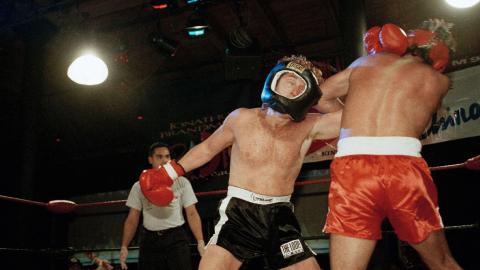Walter Tull: The Tottenham trailblazer and WW1 hero
A look at the life of football pioneer and war hero Walter Tull. He was one of the very first black players in a major British football team and the first black commissioned officer in the British Army.
Think of the great British footballing icons from the distant past. Fans may point to the likes of the Busby Babes, or legendary goalie Gordon Banks, or Stanley Matthews, the “wizard of the dribble”. But there are some individuals that have unfairly faded from the narrative of the beautiful game. And if there’s one player who badly deserves to become a household name, it’s Walter Tull – a trailblazer for Tottenham Hotspur, a black British player who defied the ingrained bigotry of his day to win plaudits in football AND become a war hero amid the bullet-blizzard of the WW1 trenches.
The Orphan Prodigy
Walter Tull was born in 1888 – a time of imperialist might abroad and rigid class and social divisions at home, leading to the kind of social deprivation that allowed the likes of Jack the Ripper to ply their grisly trade. It was, in short, a difficult time to be a mixed-race Briton.
Walter was the grandson of a slave, and the son of a carpenter from Barbados who had settled down with a woman from Kent he had met through the local church.
Walter’s early years were far from smooth. When Walter was just a child, his mother died from cancer, and his father married her cousin – only to himself die just a few years later from heart disease.
His stepmum struggled to look after young Walter and his many siblings, and made the decision to send two of the children to an orphanage in London’s gritty Bethnal Green area. These two were Walter himself and his brother Edward.
"...a promising player who never had the fame he deserved, and deserves his place in history for being one of the very first to break the racial barriers of his day – both in terms of sport and the military."
The institutional hostility towards non-whites is shown by the fact that a local charity organisation felt it needed to warn the orphanage about the young Tull boys. “The father of these children was a negro and they are consequently coloured children,” their letter read. “I do not know if you are aware of this or whether it will in any way affect the application?”
Fortunately, the orphanage had no qualms about taking Walter and Edward on, and it wasn’t too long before Edward was actually adopted by a couple in Scotland. This was a huge blow to Walter, who felt more isolated than ever, but in his teens he blossomed into an ambitious and driven boy, developing an unlikely interest in printing. He became an apprentice at a print shop, and even had a career in newspapers in mind, before a rival passion came into play: football.
Having played in the orphanage team, young Walter’s skill was so obvious that he was soon signed up by prominent amateur club Clapton FC. His time there was triumphant – Walter won medals playing in tournaments like the FA Amateur Cup and the London County Amateur Cup, and came to the attention of a major club: Tottenham Hotspur.
Walter made his debut for Spurs in 1909, becoming one of the very first black players in a major British team. He made an immediate impact on the sport, with journalists gushing over his nimble footwork and suave, unruffled demeanour on the pitch. One newspaper sportwriter described how Tull’s skill “astounded everyone who saw it”, and praised his “perfect coolness” and “accuracy of strength in passing”.
But entering the limelight made Walter a target of the brazen bigotry of the time. One match, against Bristol City, saw him subjected to particularly vile abuse by the other team’s supporters. It was so bad that some journalists commented on it, defending Walter’s honour. One wrote in his column, with palpable fury: “Let me tell those Bristol hooligans that Tull is so clean in mind and method as to be a model for all white men who play football.”
After playing only a handful of games, Walter was relegated to the reserves – perhaps because the sheer vitriol he inspired was becoming a public embarrassment for the various football clubs. It must have been an incredibly frustrating period for Walter, but things took a brighter turn when he was transferred to Northampton Town, then managed by Herbert Chapman – now regarded as one of the most innovative and ingenious football managers of all time.
It was an auspicious period in Walter’s career – so much so that he was even in talks to play for Glasgow Rangers. But then something happened that would end his footballing career abruptly and forever. That something was war.
A Soldier Like No Other
Walter enlisted with the army towards the end of 1914, and became part of a “football battalion”, made up of fellow players. For a while, it was a waiting game – so much so that Walter and his army buddies were frankly bored. As he wrote in a letter to his brother Edward, “for the last three weeks my Battalion has been resting some miles distant from the firing line, but we are now going up to the trenches for a month or so… It is a very monotonous life out here when one is supposed to be resting and most of the boys prefer the excitement of the trenches.”
Pretty soon he was in the thick of the action, fighting in the mud and muck of the Somme. Europe was being ripped up by the first war of the machine age, and – while Walter survived his initial experience in the bloody onslaught of the Somme – he was taken back to England suffering from what was then known as “shell shock”.
It didn’t get in the way of his stellar military career, though. In May 1917, Walter made history by earning a commission as an officer, making him the first black commissioned officer in the British Army. This was despite regulations stipulating officers had to be of “pure European descent”. The thinking was that white soldiers would never take orders from black or mixed-race superiors – an idea that was exposed as a toxic lie by the respect and veneration troops had for Walter Tull.
In fact, he was specifically praised for his “gallantry and coolness” after leading many men on a daring night raid through enemy lines. Under Walter’s command, they crossed a freezing river and came back, without a single casualty.
After many daring escapades, Walter found himself embroiled in the German “spring offensive” of 1918. A desperate attempt to turn the tide of war, it saw the Germans mount a series of massive attacks on the Western Front, and it was during one of the skirmishes – near a village in France – that Walter Tull was hit by a German bullet and died immediately. His body was never recovered, despite the best efforts of a young soldier – and fellow footballer – who tried to bring him back from the blasted hellscape of no man’s land.
An Amazing Life and Legacy
Walter Tull’s warmth and heroism touched those around him in the trenches. In a letter sent to his brother, a fellow soldier wrote of how he was “brave and conscientious”. The letter went on to say, “Personally I have lost a friend. Can I say more, except that I hope that those who remain may be true and faithful as he.”
Yet, despite talk of Tull being awarded a Military Cross, it never came to be. Phil Vasili, author of "Colouring Over the White Line: The History of Black Footballers in Britain", believes that Walter’s promotion to officer, which directly contravened racist regulations at the time, meant that “to have given him his Military Cross would have admitted to the powers-that-be at the War Office that rules had been broken in commissioning a black man.”
The significance of Walter Tull is only now being appreciated. As a footballer, he never had the opportunity to grow and prove how brilliant he could be. While early appearances with Spurs may have won plaudits from the press, he was soon shunted aside by the pressures of racial prejudice, and the outbreak of war curtailed his career completely. So, this isn’t so much a case of a once-famous footballer being forgotten over time, but, rather, of a promising player who never had the fame he deserved, and deserves his place in history for being one of the very first to break the racial barriers of his day – both in terms of sport and the military.
Though those in the know have hailed him for breaking boundaries and changing popular attitudes to black and mixed-race people in sport. Jimmy Floyd Hasselbaink, who served as manager of Walter’s old team Northampton Town, has praised Walter for making his own experience easier as a black player and manager. Other players have also chimed in, and in 2018 numerous MPs signed a letter campaigning to have him awarded a Military Cross.
One of the most eloquent testimonies to Walter Tull’s life is inscribed on a special memorial at Sixfields Stadium, home of Northampton Town. Unveiled in 1999, it reminds us that Walter’s success “ridiculed the barriers of ignorance”, and who – “though rendered breathless in his prime” – still shines a light for all players and soldiers to have come since.
For more articles about Black History, check out Sky HISTORY's Black History Month hub.
















